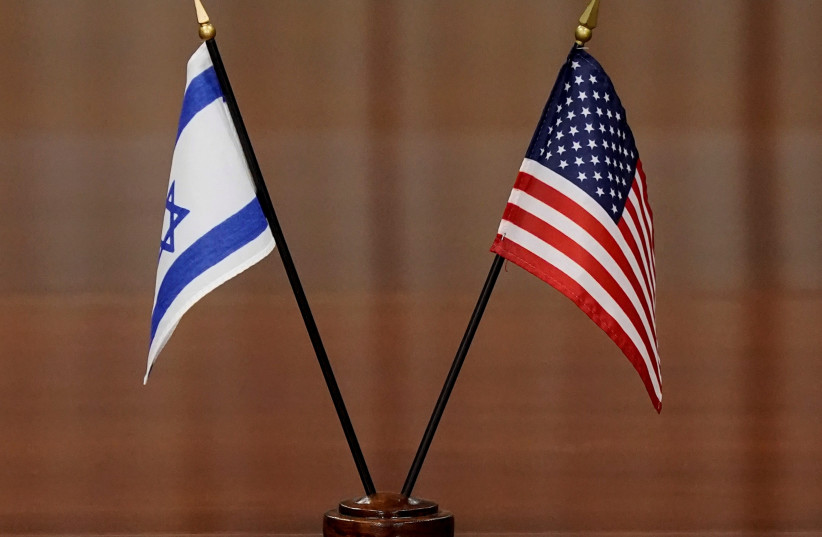On Tuesday April 25, when the United States House of Representatives passed H. Res 311, it was more than a salute to Israel on her 75th birthday. It was a solid, resounding, show of support for the Jewish state. It was the proverbial pat on the back from 400 US representatives.
It was a sign that things are not as bad as we are being led to believe between Jerusalem and Washington. A vote of 400 to 19 in support of Israel during these days of Israel bashing is as close to a unanimous vote as any lover of Israel could hope for.
Only one Republican voted against the resolution. A staunch isolationist, his name is Congressman Thomas Massie of Kentucky and he simply could not vote in favor of the resolution. The 17 other “nay” voters were, as expected, composed of the entire infamous Progressive Caucus, plus one other, Betty McCollum of Minnesota.
It is important to take in the enormity of a vote like this, especially in light of a very fractionalized Washington. It was just a few weeks ago when US President Joe Biden publicly dressed down Prime Minister Benjamin Netanyahu, saying that he will not invite the Israeli prime minister to the White House any time soon because DC disagrees with Netanyahu’s push for judicial reform.
And yet, soon thereafter, nearly the entire House of Representatives, including, of course, Biden devotees and die-hard Democrats – not just Republicans, signified their support for Israel.

Certainly, there are currents and pockets in the halls of US power where Israel is reviled like the Progressive Caucus. But at this stage, they are a small group with very little influence. They are colorful and they are loud and they speak in sound-bites, but they are not powerful.
Why do we think US support for Israel is in danger?
On the one hand, both in Israel and in the US, the Jewish world is bombarded with examples of how tensions are fraught and support for Israel is waning. We are bombarded with pleas to fight on Israel’s behalf and convince others of Israel’s value to the US and to the world. And then, along comes H. Res 311, proving that the situation is not as bad or as dire as it is portrayed in the Jewish and Israeli media.
There is a reason for this stark disparity between the message and the reality. It is not simply a misread of the political agenda. It is a time-honored strategy of how to motivate and how to raise money for “the cause.”
Crisis is the greatest of all motivational tools. Crisis activates people to get involved. Crisis stimulates contributions. When things are going well people are complacent – they do not give. Not of their time, not of their energy, not their money.
I AM not suggesting that there has not been a decline in the perception of the essential role of Israel and the special relationship between Israel and the US. It is just not as bad as it is often portrayed. And it’s all laid out clearly in the Resolution.
H. Res 311 proclaims four important US policies. It encourages deepening US-Israel cooperation on every level, especially security. It encourages expansion of the Abraham Accords.
And it wishes Israel a happy 75th birthday, encouraging “the expansion and strengthening of the Abraham Accords to urge other nations to normalize relations with Israel and ensure that existing agreements reap tangible security and economic benefits for the citizens of those countries and all peoples in the region.”
It encourages the US and Israel “to continue to deepen and expand bilateral cooperation across the full spectrum of economic, security, and civilian issues.” It expresses “continued support for security assistance to Israel as outlined in the United States-Israel Memorandum of Understanding to ensure that Israel can defend itself by itself.”
And finally, it also calls for support of “Israel’s robust involvement as an active member of the community of nations to benefit Israel and the United States as partners who share common values and a commitment to democracy.”
Every five years Congress passes a resolution similar to this resolution. This year’s was a little different. This year’s resolution did not mention a two-state solution with the Palestinians. In fact, in this resolution there is no mention at all of the Palestinians. And while it does mention the countries in the region with whom Israel has agreements – Egypt, Jordan, UAE, Bahrain, Sudan, Morocco – interestingly, it does not mention the 1993 Oslo Accords with the Palestinian Authority.
There was a draft of the proposed language that was, in the end, NOT put into this resolution. That draft is very similar to previous resolutions supporting, “a negotiated settlement leading to a sustainable two-state solution with the democratic, Jewish State of Israel and a demilitarized, democratic Palestinian state living side-by-side in peace and security.”
Some Democrat representatives wanted this language and wrote a letter to that fact. The important point here is that when that language was not incorporated into H. Res. 311, those Democrats did not walk back their support.
The Republicans in Congress, like the vast majority of Israelis, simply do not have faith in the Palestinians as partners at this stage. And despite all their disagreement and differences on so many issues, Democrats and Republicans joined together in their support of Israel.
That’s telling.
The writer is a columnist and a social and political commentator. Watch his TV show Thinking Out Loud on JBS.
